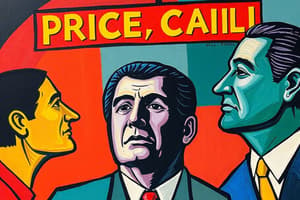Podcast
Questions and Answers
A price ceiling is a legal maximum price at which a good can be sold.
A price ceiling is a legal maximum price at which a good can be sold.
True (A)
A price floor is a legal maximum price at which a good can be sold.
A price floor is a legal maximum price at which a good can be sold.
False (B)
In 1973, OPEC raised the price of crude oil, which led to a reduction in the supply of gasoline.
In 1973, OPEC raised the price of crude oil, which led to a reduction in the supply of gasoline.
True (A)
The U.S. government implemented a price floor on gasoline, leading to long lines at gas stations.
The U.S. government implemented a price floor on gasoline, leading to long lines at gas stations.
If the minimum wage is set above the equilibrium wage, it leads to unemployment.
If the minimum wage is set above the equilibrium wage, it leads to unemployment.
A higher minimum wage benefits all workers by raising their incomes.
A higher minimum wage benefits all workers by raising their incomes.
The minimum wage has no effect on high-skilled workers because their wages are already above the minimum.
The minimum wage has no effect on high-skilled workers because their wages are already above the minimum.
The government uses taxes primarily to raise revenue for public purposes such as roads, schools, and national defense.
The government uses taxes primarily to raise revenue for public purposes such as roads, schools, and national defense.
Tax incidence refers to the way the burden of a tax is shared among participants in a market.
Tax incidence refers to the way the burden of a tax is shared among participants in a market.
When a tax is imposed on buyers, the price they pay decreases by the amount of the tax.
When a tax is imposed on buyers, the price they pay decreases by the amount of the tax.
Flashcards are hidden until you start studying
Study Notes
Price Ceilings
- A price ceiling is a legal maximum price at which a good can be sold.
Price Floors
- A price floor is a legal minimum price at which a good can be sold.
OPEC and Gasoline Prices
- In 1973, OPEC (Organization of the Petroleum Exporting Countries) raised the price of crude oil.
- This led to a reduction in the supply of gasoline.
Gasoline Price Floors
- The U.S. government implemented a price floor on gasoline.
- This resulted in long lines at gas stations.
Minimum Wage
- If the minimum wage is set above the equilibrium wage, it leads to unemployment.
- Some argue a higher minimum wage benefits all workers by raising their incomes.
- The minimum wage generally does not affect high-skilled workers since their wages are already above the minimum.
Taxes
- The government primarily uses taxes to raise revenue for public purposes, such as roads, schools, and national defense.
- Tax incidence refers to how the burden of a tax is shared among market participants.
- When a tax is imposed on buyers, the price they pay decreases by the amount of the tax.
Studying That Suits You
Use AI to generate personalized quizzes and flashcards to suit your learning preferences.



